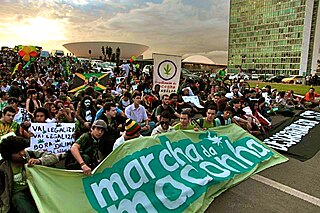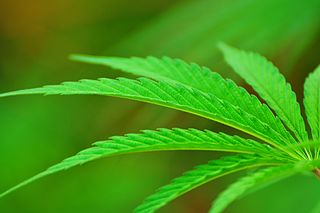Related Research Articles

The Confiscation Act of 1862, or Second Confiscation Act, was a law passed by the United States Congress during the American Civil War. Section 11 of the act formed the legal basis for President Abraham Lincoln's Emancipation Proclamation.

The legal history of cannabis in the United States pertains to the regulation of cannabis for medical, recreational, and industrial purposes in the United States. Increased restrictions and labeling of cannabis as a poison began in many states from 1906 onward, and outright prohibitions began in the 1920s. By the mid-1930s cannabis was regulated as a drug in every state, including 35 states that adopted the Uniform State Narcotic Drug Act. The first national regulation was the Marihuana Tax Act of 1937.

Cannabis in Jamaica is illegal, but possession of small amounts was reduced to a petty offence in 2015. Cannabis is locally known as ganja, and internationally cannabis consumption plays a prominent role in the nation's public image, being tied to cultural touchstones such as Rastafari and reggae music.
Cannabis in Madagascar is illegal, but is produced and consumed domestically.

Cannabis in South Africa has been decriminalised by the country's Constitutional Court for personal consumption by adults in private. However, laws prohibiting use outside of one's private dwelling and buying and selling cannabis still remain. Since regulations against the purchase of products containing cannabis still remain in effect, it is unclear how the ruling can be enforced.

Cannabis in Nepal has been illegal since 1960, but the country has a long history of use of cannabis for Ayurvedic medicine, intoxicant and as a holy offering for Hindu god Shiva and continues to produce cannabis illicitly.

Cannabis in Brazil is illegal and criminalized, but possession and cultivation of personal amounts and for private use were de-penalized in 2006. Use of cannabis medications is allowed for terminally ill patients or those who have exhausted other treatment options.
Cannabis in Ethiopia is illegal, and possession of cannabis can result in up to 6 months imprisonment.

Cannabis in Pakistan is illegal for recreational use, although since September 2020, extracts of cannabis can be used for industrial and medical use. Cannabis is widely consumed in Pakistan as charas and bhang.
Cannabis in Sri Lanka is legally sold through Ayurveda herbal shops, and can be used for medical and scientific purposes if given a license by the Ministry of Health.

In Thailand, cannabis, known by the name ganja, is regulated under the Narcotics Act. As of 2021, medical cannabis can be purchased from licensed retailers, and households can grow up to six plants for personal use. While parts of the cannabis plant that contain less than 0.2 percent tetrahydrocannabinol (THC), which includes the roots, stalks, stems, and leaves, can be sold or used for food or cosmetics, recreational use remains prohibited and the flowers and seeds must be sent to state medical facilities.
The list includes and details significant events that occurred in the global history of national-level implementations of, or changes made to, laws surrounding the use, sale, or production of the psychoactive drug cannabis.
Cannabis in Réunion is illegal, but is grown illicitly and is locally known as zamal. It is used both recreationally and ritually.

The history of cannabis and its usage by humans dates back to at least the third millennium BC in written history, and possibly further back by archaeological evidence. For millennia, the plant has been valued for its use for fiber and rope, as food and medicine, and for its psychoactive properties for religious and recreational use.
Cannabis in Ghana is illegal without license from the Minister of Health, but the nation is, along with Nigeria, among the top illicit cannabis-producing countries of West Africa. Cannabis in Ghana is known as wee or devil's tobacco.
Cannabis in Mozambique is illegal; the drug is locally referred to as suruma.
Cannabis in Saint Vincent and the Grenadines was prior known to be illegal but is now decriminalized up to 2 ounces. Persons caught with 56 grammes or less of the drug will not be subject to incarceration. Instead, they will be fined a maximum of $500 and be subject to other measures including begin given educational material about cannabis; counselling and rehabilitative care. These provisions were among several amendments that were made to the Drugs Amendment Act (2018), which was passed in Parliament on July 25. In addition to only being a ticketable offense, the amendment provides for Vincentians to smoke the herb in the privacy of their homes and in places of worship of the Rastafarian faith without punishment. The amendment also said that the Minister may designate a list of public areas where the smoking of cannabis may be allowed. The country has correlating legal medical marijuana laws. Parliament on December 11, 2018, passed two Acts, one which establishes a Medical Cannabis Industry in St Vincent and the Grenadines and the other which offers amnesty for traditional marijuana growers. The Vincentian Parliament passed legislation to protect the intellectual property of breeders of new plant varieties in St. Vincent and the Grenadines (SVG), the Plant Breeders’ Protection Bill, 2019. It sets up the jurisprudential framework within which these persons will be able to accrue the rights, how these rights will be protected, how they will be published so that persons in the entire society, in the court and globally, can be aware of the hard work which was done, the agriculture minister said. Under the law, a person must obtain the authorization of a grantee with respect to propagating material of the protected variety, to produce or reproduce, condition the material for the purpose of propagation, offer the material for sale, to sell the material, import or export the material, or stock the material for any of the previous purposes. Regarding infringement of plant breeders’ rights, the following acts are exempt: an act done privately for non-commercial purposes, an act done for experimental purposes, or an act done for the purpose of breeding other plant varieties. The law allows for compulsory licenses where a person may apply to the court for the grant of a compulsory license to exploit a protected variety in SVG. Subject to terms that the court thinks fit, the court may make an order for the grant of compulsory licenses if it is satisfied that the grant of the compulsory licenses is in the public interest. Offense under the law include falsification of register and falsely representing a plant variety as a protected variety. The law also orders the registrar to publish applications for plant breeders’ rights, proposed and approved denominations, withdrawals of application for plant breeders’ rights, the rejection of applications for plant breeders’ rights, any grant of a breeders’ right, any change in the breeder or the agent in respect of a plant variety, lapses of plant breeders’ rights, any invalidation or revocation of a plant breeder's rights, the licenses in relation to plant breeders’ rights, where applicable. Cannabis is widely grown illicitly on the island and is the nation's most valuable agricultural product. Saint Vincent is the most prolific producer of cannabis in the Caribbean, other than Jamaica.
Cannabis in Rwanda is legal for medicinal purposes, but illegal for recreational purposes.
Cannabis in the Democratic Republic of the Congo is legal for industrial, medicinal and scientific use. It continues to be illegal for recreational use.
Cannabis in The Bahamas is illegal.
References
- 1 2 3 Vera Rubin (1 January 1975). Cannabis and Culture. Walter de Gruyter. pp. 107–. ISBN 978-3-11-081206-0.
- ↑ Annals of the South African Museum. South African Museum. 1988. p. 742.
- ↑ Hendrika Fourie; Vaughan W. Spaull; Robin K. Jones; Mieke S. Daneel; Dirk De Waele (28 February 2017). Nematology in South Africa: A View from the 21st Century. Springer. pp. 300–. ISBN 978-3-319-44210-5.